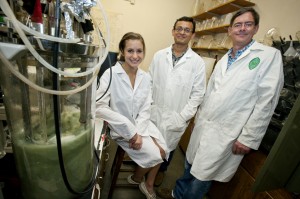
A team of Tulane University scientists has discovered a bacterial strain, they call ?TU-103? that breaks down paper to produce butanol, a biofuel that can serve as a substitute for gasoline.
According to David Mullin, an associate professor of cell and molecular biology at Tulane, this is the first bacterial strain found to produce the butanol directly from cellulose.
?Cellulose is found in all green plants and is the most abundant organic material on earth. Converting it into butanol is the dream of many,? says Harshad Velankar, who was a postdoctoral fellow in Mullin?s lab. ?In the United States alone, at least 323 million tons of cellulosic materials that could be used to produce butanol are thrown out each year.?
The team first identified the bacteria in animal dropping and then developed the process to produce butanol.? Mullin says TU-103 is the only known butanol-producing clostridial strain that can grow and produce butanol in the presence of oxygen.? Normally oxygen kills butanol-producing bacteria.
Unlike ethanol, which requires changes to gasoline engines, Butanol can be used ?without modifications to the engine. ?It can also be transported through existing fuel pipelines because it is less corrosive.? Butanol also contains more energy than ethanol so theoretically it could get better fuel economy than vehicles burning ethanol.
?This discovery could reduce the cost to produce bio-butanol,? says Mullin. ?In addition to possible savings on the price per gallon as a fuel, bio-butanol produced from cellulose would dramatically reduce carbon dioxide and smog emissions in comparison to gasoline.? The innovative process also could have a positive impact on landfill waste.
A patent is pending but the process is still untested for market viability.







